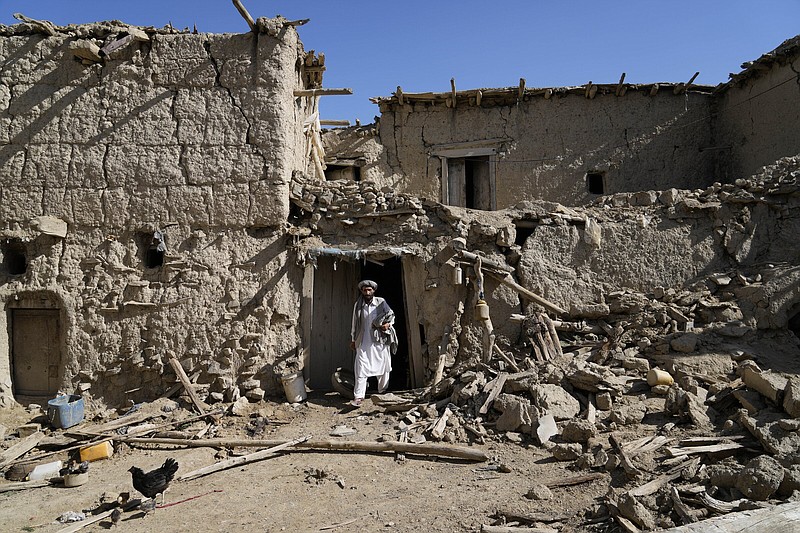GAYAN, Afghanistan -- Afghanistan's deadly earthquake last week struck one of the poorest corners of a country that has been hollowed out by increasing poverty. Even as more aid arrived Saturday, many residents have no idea how they will rebuild the thousands of homes destroyed in villages strung through the mountains.
The quake, which state media says killed at least 1,150 people, hit hardest in a region of high mountains where Paktika and Khost provinces meet by the Pakistani border.
Every one of the nearly two dozen homes in one village, Miradin, were reduced to rubble by Wednesday's quake.
In the rainy nights since, its several hundred residents have been sleeping in nearby woods and had still not received the aid that was slowly making its way into quake-hit areas.
Miradin residents told reporters they worried whether they'd be able to rebuild before the harsh winter hits in only a few months. Summer is short in the mountains; nights are already chilly.
It's a fear felt across the quake-hit region, where nearly 3,000 homes are believed to have been destroyed. The U.N.'s humanitarian coordinating organization OCHA said it had reports of 700-800 families in the area still living out in the open.
"We are facing many problems. We need all kind of support, and we request the international community and Afghans who can help to come forward and help us," said Dawlat Khan, a resident of Paktika's Gayan District. Five members of his family were injured when his house collapsed.
Among the dead from Wednesday's magnitude 6 quake are 121 children and that figure is expected to climb, the U.N. children's agency representative in Afghanistan said. He said close to 70 children were injured. An aftershock Friday took five more lives.
The total toll of 1,150 dead and at least 1,600 injured was reported by the Afghan state news agency Bakhtar.
The United Nations Office for the Coordination of Humanitarian Affairs has put the death toll at 770 people. Either toll would make the quake Afghanistan's deadliest in two decades.
More aid was piling in on Saturday.
At Urgan, the main city in Paktika province, U.N. World Health Organization medical supplies were unloaded at the main hospital. In quake-hit villages, UNICEF delivered blankets, basic supplies and tarps for the homeless to use as tents.
In the district of Spera in Khost province on Saturday, UNICEF distributed water purification tablets along with soap and other hygiene materials.
Aid groups said they feared cholera could break out after damage to water and hygiene systems.
New cargo flights of aid supplies arrived in Afghanistan from Pakistan, Uzbekistan and Turkmenistan, officials said. Pakistan's government and a Pakistani charity had already sent 13 trucks carrying food, tents, lifesaving medicine and other essential items, and Pakistan has opened some border crossings for injured to be brought in for treatment.
Overstretched aid agencies said the disaster underscored the need for the international community to rethink its financial cutoff of Afghanistan since Taliban insurgents seized the country 10 months ago.
That policy, halting billions in development aid and freezing vital reserves, has helped push the economy into collapse and plunge Afghanistan deeper into humanitarian crises and near famine.
The effort to help the victims has been slowed by geography and by Afghanistan's decimated condition.
Rutted roads through the mountains, already slow to drive on, were made worse by quake damage and rain. The International Red Cross has five health facilities in the region, but damage to the roads made it difficult for those in the worst-hit areas to reach them, said Lucien Christen, ICRC spokesman in Afghanistan.
Aid groups said that while they are rushing to help the quake victims, keeping Afghanistan just above catastrophe through humanitarian programs is not sustainable.
"We are basically letting 25 million Afghan people to starve, to die, not to be able to earn their own living if we keep on with this financial blockade," said Rossella Miccio, president of the aid organization Emergency that operates a network of health-care facilities and surgical centers across Afghanistan.
Information for this article was contributed by Munir Ahmed and Rahim Faiez of The Associated Press.
